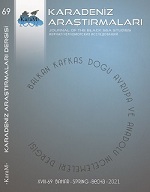THE SECURITY OF THE BLACK SEA: THE STRUGGLE IN THE BLACK SEA AND TURKEY'S POLICY IN THE POST-COLD WAR ERA
THE SECURITY OF THE BLACK SEA: THE STRUGGLE IN THE BLACK SEA AND TURKEY'S POLICY IN THE POST-COLD WAR ERA
Author(s): Ferhan Oral, Şafak OğuzSubject(s): Geography, Regional studies, Diplomatic history, Political history, Security and defense, Transformation Period (1990 - 2010), Present Times (2010 - today), Geopolitics
Published by: Karadeniz Araştırmaları Merkezi
Keywords: Black Sea; NATO; A2/AD; Montreux Convention; Maritime Security;
Summary/Abstract: During the Cold War, the Black Sea was not considered as the first priority for NATO states because of the supremacy of the Soviet Union in the region. The joining of Romania and Bulgaria to NATO in 2004, however, changed the balance of power in the region completely and the U.S. and NATO accelerated their efforts to contain Russia in the Black Sea. NATO’s policies which aimed at including Georgia and Ukraine to the pact, however, encountered harsh reaction by Russia, which felt encircled by the West in 2008 and 2014 respectively, and provided Russia opportunities to annex Crimea and to access the coasts in the breakaway region Abkhazia. The new chess game in the Black Sea enabled Russia to strengthen its Black Sea Fleet (BSF) and ‘Anti-Access Area Denial’ (A2/AD) capabilities, while the U.S. increased its presence substantially in the region with new NATO bases in Bulgaria and Romania in addition to maritime exercises and freedon of navigation operations in the Black Sea. Turkey, on the other hand, as a NATO member closely cooperating with Russia in recent times, has been struggling to preserve peace in the Black Sea, focusing especially on preservation of the status established by the Montreux Convention.
Journal: Karadeniz Araştırmaları
- Issue Year: 2021
- Issue No: 69
- Page Range: 1-16
- Page Count: 16
- Language: English

